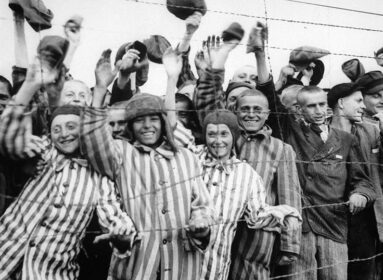By Alex Traiman/JNS.org
While the 1967 Six Day War ushered in a 46-year period of controversial and complex political realities, Israelis joyously celebrate that year’s historic military victories over Egypt, Syria and Jordan on an annual basis.
In particular, Israelis commemorate Yom Yersushalayim — Jerusalem Day — the national holiday celebrating the 1967 reunification of Jerusalem and the establishment of Israeli control over the Old City. The famous paratrooper call, which Israelis vividly recall, “Har Habayit b’yadeinu” (“The Temple Mount is in our hands”), is a symbol of national victory and rebuilding for many within the modern State of Israel.
“When we hear that call, it is a moment that is full of emotions. Yom Yerushalayim is a day of miracles of biblical proportion,” Chaim Richman, International Director of the Temple Institute, told JNS.org. “The victory in Jerusalem evokes the most precious emotions, because it sits at the core of our identity as Jewish people. Jerusalem is mentioned over 700 times in Jewish scripture. And at the heart of Jerusalem and the Old City is the Temple Mount.”
Following the historic liberation of the Temple Mount in 1967, the Israeli government quickly handed sovereignty of the site back to the Wakf—the Muslim religious organization that served as custodian of the Temple Mount throughout Jordan’s 19-year illegal occupation of Jerusalem. The move surprised many Jews and Muslims alike.
The Temple Mount, the site of the First and Second Jewish Temples, is universally acknowledged as the holiest site in all of Judaism. According to Rabbinic sources, the First Temple stood for 410 years, and the Second Temple stood for 420 years.
Muslims consider the site to be holy, despite the fact that Jerusalem is never mentioned explicitly in the Koran. To this day, the Muslim Wakf has maintained control of the site, enforcing strict limitations on Jewish worship. As a result, the Temple Mount, of all places, has become a flashpoint where Jews are not permitted to offer peaceful prayer.
Ever since the Six Day War, Palestinian Authority leaders, including Yasser Arafat and current Palestinian Authority Chairman Mahmoud Abbas, have attempted to deny that the Temple Mount has any significance in Judaism. During the 2000 Camp David Summit, Yasser Arafat famously denied that a Jewish Temple ever stood on the site. Yet, according to a pamphlet entitled “A Brief Guide to Al-Haram Al Sharif, Jerusalem,” a visitors’ guide to the Temple Mount published by the Supreme Moslem Council in 1925, the sanctity of the Temple Mount “dates from the earliest times.”
“Its identity with the site of Solomon’s Temple is beyond dispute,” the pamphlet says. “This, too, is the spot, according to the universal belief, on which ‘David built there an altar unto the Lord, and offered burnt offerings and peace offerings.’”
And while many have not been interested in bringing the question of Jewish sovereignty on the Temple Mount to the front of the national agenda, today growing numbers of Israelis are questioning how the holiest site in Judaism, at the heart of the capital of the Jewish State, has become off-limits to Jewish worship.
“There is a serious sovereignty issue, and there are psychological issues that are holding us back. It’s a very complicated issue. The best thing is to be positive,” said Richman. According to Richman, there have been several positive developments over the last several years.
Last week, MK Miri Regev, the newly elected chair of the Knesset Interior and Environment Committee, made national headlines by stating, “I don’t understand why a Jew is not allowed to pray in the most sacred place for him — the Temple Mount.”
Regev added that she intended to conduct a fact-finding tour of the area with a special committee in the coming weeks to revisit the issue.
Regev’s remarks were met with criticism by other members of the Israeli government. Deputy Finance Minister Mickey Levy, a former commander of the Jerusalem Police, stated, “This is a provocative and unnecessary move that could inflame the area and lead to grave consequences.”
Yet Richman refuses to be deterred.
“Twenty years ago, politicians speaking about such things wouldn’t have gotten a moment of media time. But now, people are talking about the situation. That means there is a paradigm shift dynamically in the public discourse,” Richman told JNS.org.
This shift is in part due to the work of organizations like that of the Temple Institute, led in Israel by Rabbi Yisrael Ariel — one of the paratroopers that took command of the site during the Six Day War.
As international director, Richman is a rabbinic scholar who has worked with The Temple Institute for over 25 years studying and teaching the rituals that took place in the Temples. For years, The Temple Institute has been recreating — according to precise specification — the vessels that were used in Jewish worship during the periods of the First and Second Temples. The Institute has produced a wealth of educational material, including a series of famous paintings re-enacting scenes of the Temple periods. For its scholarship, The Temple Institute has received an array of accolades from Israel’s Ministry of Education and the Ministry of Religious Affairs. The institute is similarly recognized by Israel’s Ministry of Tourism.
According to Richman, more than 100,000 individuals visit The Temple Institute’s Museum each year. Just this past month, the Institute opened a new, state-of-the-art exhibition meters from the Temple Mount that is meant to elicit the experience that Jews would have experienced in one of the Temples.
“We are grateful for the modern victories in Jerusalem,” Richman said. “But Jerusalem’s history is just beginning. And so Yom Yerushalayim, with every year that goes by, has more and more significance because it is like a portal to the future.”








 Southern New England Jewish Ledger
Southern New England Jewish Ledger










